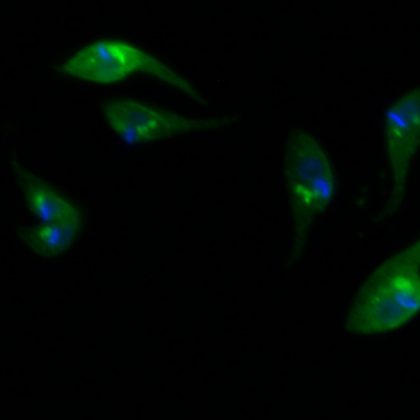Moxidectin: A New alternative for Treating a Hidden Parasite: Strongyloides stercoralis
The latest Paper of the Month for Parasitology is Ivermectin vs moxidectin for treating Strongyloides stercoralis infection: a systematic review and is freely available as open access
The microscopic parasite Strongyloides stercoralis infects millions of humans worldwide, often without symptoms. For years, the treatment of choice has been ivermectin, a drug that has been recognized for its use in combating diseases, such as river blindness. However, what is another option? Our recent study compared ivermectin to its lesser-known antiparasitic, moxidectin, and the results were promising.
The Problem: Strongyloidiasis, an infection caused by this parasite, is sneaky. Many people do not even know that they have it because they live in the guts of infected people. The infection is not serious for most, but for those with weakened immune systems, it can be fatal. People become infected when they come into contact with soil or water contaminated with infectious worms. Chronic infection usually causes skin rash, vomiting, diarrhea, constipation, and respiratory problems such as asthma‐like illnesses. The parasite thrives in tropical regions but also pops up in non-endemic areas due to travel and migration. Diagnosis of this condition is complicated, and treatment options are limited.
What our research says: we analyzed two clinical trials involving over 800 adults in Southeast Asia. They compared moxidectin (a drug widely used in veterinary medicine) with ivermectin. Moxidectin worked just as well as ivermectin in curing chronic strongyloidiasis, with similar mild side effects like headaches and stomach pain. No serious reactions were reported and, importantly, none of the patients died from either treatment.

Photo Credits: Michael J. Klein, M.D. / Getty Images
Why This Matters: Implications for the future:
New Option, Same Safety: Moxidectin is not inferior to ivermectin, giving doctors another tool.
Weight Does not Matter: Unlike ivermectin, which requires weight-based dosing, moxidectin uses a fixed dose, simplifying treatment in resource-poor settings.
Resistance problem: With ivermectin being used globally for other diseases, resistance can emerge. Moxidectin offers a backup.
However, the study did not include children, the elderly, or immunocompromised patients (who are most at risk of severe cases). The current data are insufficient to make a conclusive statement regarding appropriate management, and further research is needed. However, this is good news for an average healthy adult.
Big Picture: This is not only about one parasite. It is about preparing for global health challenges, whether fighting neglected diseases or ensuring treatment options. However, more research is needed, as well-designed trials may help investigate the effect in different groups of patients to facilitate adherence.
So next time you hear about “moxidectin,” think of it as ivermectin’s alternative for treating Strongyloides stercoralis infections.
The paper Ivermectin vs moxidectin for treating Strongyloides stercoralis infection: a systematic review by Cesar Henriquez-Camacho, Jose A. Pérez-Molina, Dora Buonfrate, Paola Rodari ,Eduardo Gotuzzo ,Benilde Luengo and María Nieves Plana, published in Parasitology, is freely available as open access.







I was totally shocked when I read the information about how so many
Do autopsies and find bodies human bodies full of parasites from the brain to the feet it’s gross and doctors just don’t seem to want to take notice I said something to my doctor and then my doctor was like oh just have a stool test that’ll tell you if you have them or not no it doesn’t tell you the whole story so unfortunately when it comes back negative they think that you’re free and clear when you’re not necessarily I even had taken a laxative that did release a lot of them into a diarrhea fecal matter they were moving it was gross I thought I took a picture and I even took a picture of a moving I tried to show it to my doctor cuz my doctor just goes me on so many things that I have done studying on the sidelines about especially when it comes to my health My doctor would not look at the picture she just really didn’t want anything to have to do with any of it this upsets me especially when I have certain symptoms that keep annoying me and I’m getting no response ,
I also
Mentioned it to a couple different ER dockers when I was in ER and the doctor said no not here in the United States well with the way food standards are nowadays you can get parasites from so many different types of foods because things have become so relaxed when it comes to fish for just one example ,
To me this is a very important subject of health when it comes to us humans besides the animals……
How can I get any help addressing any other types of parasites that might be in my human body????